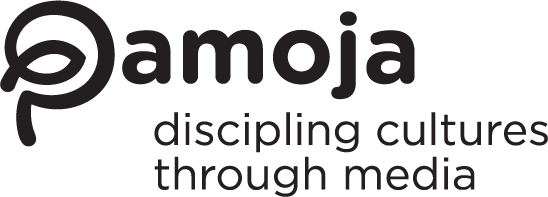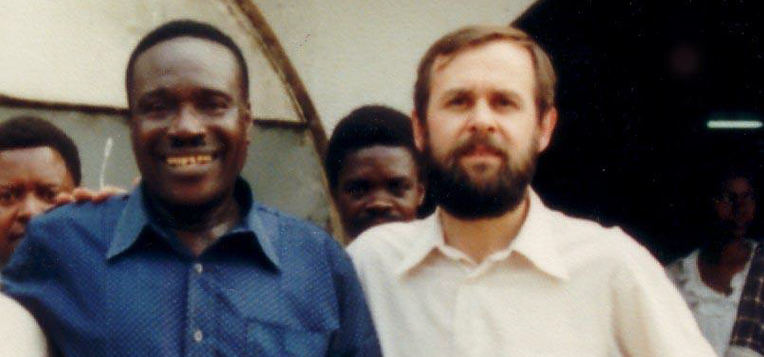History is a funny thing – it doesn’t really have a beginning – but the history of Pamoja Ministries can be linked with Sig & Joy Feser’s arrival in Africa. That happened in 1986, when Sig Feser went on a fact-finding trip to Kinshasa, DR Congo (then called Zaire), following the call of God. Africa had never been Sig’s goal – his family had immigrated to Canada when he was a child and he had grown up being taught by his mother to be thankful for having “made it” to Canada. But God called the Fesers into missions, and so, in 1988, they moved to Kinshasa. They only stayed there for 8 months before they were kicked out by the government – pawns in a dispute between the church group and the government, but the impact of those 8 months has shaped more than 25 years of subsequent ministry. Corner stones were laid in Kinshasa that continue to support the ministry of Pamoja today. Here, then, is some of the early history, as told by Sig.
1986
This picture records my first African Church meeting (1986) in Kinshasa, Democratic Republic of Congo (former Zaire). It was “Sukana Sanza”, “Super Sunday”, when the many FEPAZA churches in Kinshasa sent representatives to the end of the month super-meeting. We estimated 3000 people outside the main FEPAZA church building. Why were they outside? There were already 3000 people crowded inside! The church group is called “Nzambe Malamu”, “God is Good”!
People walked miles to get there. Their enthusiasm for a 8-hour Worship Service amazes us still today! Can you see the one car in the ‘parking lot’? It belonged to Pastor/Apostle Alexander Adini Abala, leader of the group of 3000+ churches across the Congo, and in many other countries as well.
This was our powerful initiation to the African Church and African Culture. What does a picture like this say to you, about how to spend your life and resources? We committed 24 years ago, and the commitment is still solid.

A felt need for training
As we entered the church building I looked back and these men were looking at me. I was told that these were untrained leaders from other FEPAZA churches throughout Kinshasa, coming to learn and be encouraged. It was these faces which sealed our commitment to work towards “Preserving the Harvest” by training Church leaders.
These pastors were as excited as we were. The small group of Elim Fellowship missionaries/teachers, of which we were a part, were the first foreigners to work within the FEPAZA churches.
Later in the week, still in Kinshasa, we attended a major Evangelistic Outreach in the heart of the city. The light brown to the edge of the picture is composed of people’s hands reaching out to find the provision of God for their needs. Across much of Africa, scenes like this have been seen, as people turned to Christ. We ourselves don’t do many open-air evangelistic meetings; rather we feel called to work so that the Harvest can be Preserved and the people can learn how to be good disciples of Jesus. Still it was a powerful beginning for us to see the growth that has created the need we have set out to address in the 20 years since.
These days we work with literature and dvd-teachings to train tens of thousands of African church leaders. We’ve expanded our ministry to include reaching kids and youth with media products such as films and CDs. Pamoja Ministries is Discipling Cultures through Media.
A picture like this reinforces the scripture: “The harvest is plentiful, but the labourers are few.” Perhaps you’re called to be a labourer? Or perhaps you’re called to be a supporter of the ministry?
Alexander Adini Abala was the founder and apostle of the 3000+ FEPAZA churches of the Democratic Republic of Congo (former Zaire). His apostolic ministry was marked with outstanding miracles. Several people have been raised from the dead. We met a couple of them. Many people have been healed.
At one of the “Super Sunday” meetings, a village man brought his crippled son. The son’s legs were like bent, thin sticks. Adini prayed. Nothing. He prayed again. Nothing! Eyes open, “Nkombo la Yesu”, “In the Name of Jesus”, he slapped those stick legs. Before our eyes those legs straightened, filled out with muscle. The boy stood and walked. Outstanding!
It took me (Sig) several years to shake free from some of the effects of a Scientific Materialism training which denies a spiritual realm and redefines the essences of what it means to be human. Remember, I am a PhD Physicist by training! God is greater than Physics, anytime, anywhere.
We were able to remain only 8 months in Zaire. An issue arose between the church and the government and the government “kicked us all out” to assert its power over the church.
Our exit from Zaire is an exciting story, but suffice it to say our next step in missions was in Nairobi, Kenya and then to Tanzania.
Into East Africa
From the very beginning, the Fesers set themselves to learning. They came to Kinshasa, Zaire desiring to help. Under the leadership of Alexander Adini Abala, they began an introduction to African life and faith that served as a foundation for the rest of life. The intention was that after 9 months of language and culture acquisition, that they would move north and begin to train pastors in the city of Isiro. During their time in Kinshasa they experienced overwhelming revival with signs and wonders, and they also saw the incredible need for training and resources. In over 3,000 churches of that one church group alone, there were not even a dozen trained leaders.
When, a little more than half a year later, they were kicked out of the country by the government, the Fesers moved to Nairobi, Kenya to regroup and refocus. They never did move to Isiro, but their ministry spread even beyond there. Sig’s heart was moved for the pastors he had been working with, and wanted to provide them with whatever help he could, so he set out to produce a 16-page guide for those pastors, giving them simple topical references for various topics they might want to preach about. Their memory of Maimona was clear – a pastor totally entranced with a topical teaching in a magazine on their coffee table. When asked what fascinated him so much, he told Sig & Joy that to prepare a teaching on a subject, he had three options: remember scriptures, ask a friend, or open the Bible and hope that it would fall open to a passage on that topic. Maimona was not alone – the leaders had no reference materials available to them, not even a concordance.
When, after another eight months, the door opened for Fesers to move to Mwanza, Tanzania, they did so. It was there that they encountered World MAP, who had heard about the little concordance Sig was working on and who asked him to extend the scope of it so that it could be put into Ralph Mahoney’s excellent 1,000-page minister’s manual, The Shepherd’s Staff. The concordance grew to more than 100 pages. Having heard from church leaders in China that their biggest lack was a training manual, Mahoney spent years putting together his ‘magnum opus,’ only to be denied the concordance he had expected to use because of doctrinal issues. Completed by Sig’s concordance instead, a half million copies of The Shepherd’s Staff have been distributed to house church leaders in China, and tens of thousands have been distributed across Africa. To date, over a million copies are in print globally. This project connected Pamoja to World MAP’s worldwide literature ministry.
Since 1989, we have partnered with World MAP, first doing the concordance and leadership seminars, then translation and distribution of their books and ACTS magazines. We have sent over 50 issues of ACTS magazine in Swahili to 70,000 leaders. These days, we supply books in Swahili, English, French, and Portuguese to more than a dozen countries in Africa. We can attribute our own focus on literature for leaders to a seminar spent discussing with church leaders how we missionaries could best help them. As with Mahoney’s experience in China, the African leaders told us that the most important thing we could do would be to provide them with training materials so that they could lead their congregations well. In the decades since, we have attempted to do just that. The strategic importance of this leadership book and magazine ministry was pointed out in the Tanzania section of the 2001 edition of “Operation World,” which states, “A wide range of evangelistic literature… [has] impacted the nation.” It also mentions the “overall growth of Christians from 34% to 48%.”
We at Pamoja Ministries are thrilled to be a part of that growth. When we visit pastors in villages, most, if not all, of the literature (other than the Bible) that is on their shelf has come from our office. Resting at a resort in Mombasa, we were approached by three different hotel staff people who each recognized Sig and reviewed what he had taught at the World MAP seminar in Nairobi a decade earlier. Nearer home, we asked a pastor who was carrying his carefully wrapped “ACTS” magazine why he chose to teach from the magazine, having been to Bible school. He considered his words carefully and said, “that was Theology; this is Life!” Whether through literature, video, or other media, as we move forward in ministry, we will continue to create and distribute tools and resources that bring life to those who receive them. We’re driven on by the many leaders calling us, asking for help to disciple others.




